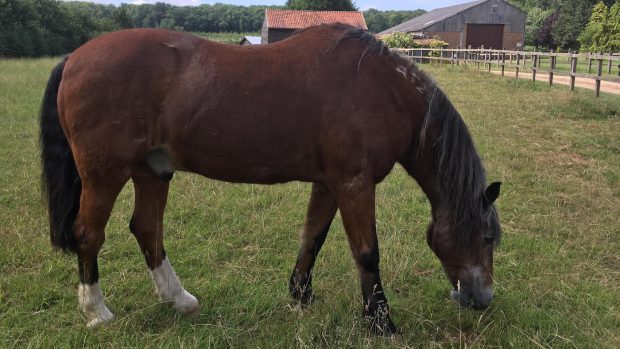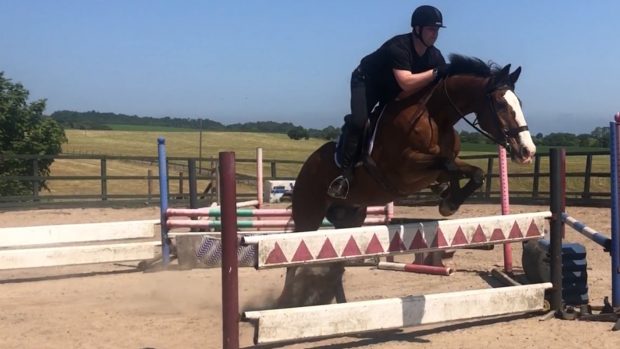Spillers’ equine nutritionist Clare Barfoot provides one H&H forum user with some helpful advice on how to feed an underweight, veteran pony after a dry summer, moving towards winter
Q: Feeding an underweight senior pony: “I’ve read loads about feeding advice for old horses, but it all seems like they feed way too much of lots of different things — it’s all confused me and I don’t know what route to take. I’ll explain a bit about my situation and hopefully you can help me out. So, the pony is a 22-year-old cob, 13.2hh, weighing about 300kg. He is looking thin but not terrible (which worries me as it is summer and he should be a lot fatter than what he is). His teeth are checked regularly but he needs soaked food as he has cupped teeth due to age so he can no longer grind down hard feed. I currently feed him Allen & Page calm and condition 1.5kg (dry weight) as it says on the bag and Dodson & Horrell sixteen plus mix one scoop (I know that he cannot grind down hard food but it goes soft in with the calm and condition), plus garlic oil with added linseed. He is fed this twice a day. I have ordered a bag of charwoods micronized linseed to see if it helps him put on weight as I’ve read very good things about it. I need to know if there’s anything else I should be giving him, or should I be feeding him more of what he’s already having. Also I need help on what to do for hay replacing in the winter. The grass out in the fields has gone all yellow and dry due to all of the hot weather we’ve had so I know this hasn’t helped him. I’ve tried giving him a large trug-full of Dengie meadow grass but he doesn’t like it and I have tried giving him soaked grass nuts and he doesn’t like that either. I know he loves calm & condition and loves sugarbeet but I don’t know how much is too much to give. So any advice would be helpful and I’m not too worried about the cost on things as he’s worth every penny, but I’m not a wealthy person so cheaper alternatives would be a bonus. Thanks in advance.”
A: Loss of condition due to dental issues is one of the common challenges of owning an older horse or pony. It was often thought that the loss of condition in senior horses was due to differences in digestive efficiencies between adult and senior horses, but research has shown that age per se doesn’t decrease the ability of the gut to absorb nutrients. Worm damage was probably the contributing factor in previous studies that have shown this.
So if it isn’t a decline in digestive efficiency what is it that causes the majority of older horses to lose weight?
Continued below…
Related articles:
- H&H forum: find out what H&H readers suggested
- How to feed a veteran to support joints and overall health
Good digestion starts with good chewing and horses’ teeth is one bodily part that simply just wears out over time; teeth become worn, loose and less effective. This means that the chewing of long fibre becomes difficult which in turn means not enough calories are eaten in order to maintain an ideal bodyweight.
One of the signs of this is ‘quidding’ where you will see clumps of wet half chewed grass or forage being dropped from the mouth. The dietary solution to this is to replace the lack of fibre with an alternative that your horse can cope with. You are right to choose a soakable conditioning feed, but it’s the fibre portion of the diet particularly during the winter months you need to replace.
This can be done by using a soft chopped fibre designed as a hay replacer such as Spillers Happy Hoof if he can manage it alongside a soaked fibre product that can be used as a complete feed such as Spillers Speedy-Mash Fibre. Other good fibre sources are unmolassed sugar beet or soaked high fibre cubes.
With regards to the amount you need to feed, be generous as you may need to replace up to 2% of your pony’s bodyweight so 6kg (dry weight) per day split across a minimum of four feeds. Micronised linseed is a good source of concentrated calories and omega 3 oils but while potentially of benefit, it will not be able to replace the fibre portion of your pony’s diet.
For more information on feeding a horse or pony, call the Spillers Care-Line on 01908 226626.





